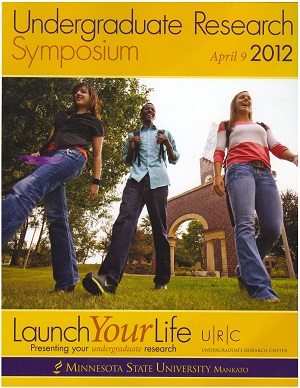Event Title
Beyond Limits: Exploring Motivation and Gender Barriers in Ultramarathoning
Location
CSU 253
Start Date
9-4-2012 10:00 AM
End Date
9-4-2012 11:00 AM
Student's Major
Human Performance
Student's College
Allied Health and Nursing
Mentor's Name
Cindra Kamphoff
Mentor's Department
Human Performance
Mentor's College
Allied Health and Nursing
Second Mentor's Name
Suzannah Armentrout
Second Mentor's Department
Human Performance
Second Mentor's College
Allied Health and Nursing
Description
An ultramarathon extends beyond the traditional 26.2-mile marathon (Tharion, Strowman, & Rauch, 1988) and includes 50 kilometers (31 miles), 100 kilometers (62.1 miles) and 135 miles. Participants must train for substantial periods of time and oftentimes in rough off-road terrain while dealing with dramatic changes in elevation and weather. Despite these challenges, participation rates are increasing; yet, most of these participants are men. For instance, for every woman participant, five men participated in the Western States 100 (Western State Endurance Run, 2012). Very few researchers have examined the motives to participate in this unique sport or investigated the gender barriers of ultramarathons. This qualitative study was conducted to further explore and understand what motivates women to run ultramarathons and the gender barriers that may prevent or make it difficult for them to participate in ultramarathons. Telephone interviews were conducted with fifteen women who completed at least one ultramarathon. The interviews were recorded and transcribed verbatim. The transcripts were read in-depth and organized into common themes across all interviews using Creswell’s (2000) framework. Gender barriers in ultramarathons were identified as: 1) child-care and household responsibilities, 2) job-related obstacles, 3) lack of support, 4) safety concerns and 5) biological barriers such as the menstrual cycle. To overcome gender barriers, these women commonly stated they used the following as motivation to continue ultramarathoning: 1) the ultra- running community, 2) the challenge of the ultra, 3) environmental factors, and 4) personal growth. Specific results and implications of our findings will be discussed in the presentation.
Beyond Limits: Exploring Motivation and Gender Barriers in Ultramarathoning
CSU 253
An ultramarathon extends beyond the traditional 26.2-mile marathon (Tharion, Strowman, & Rauch, 1988) and includes 50 kilometers (31 miles), 100 kilometers (62.1 miles) and 135 miles. Participants must train for substantial periods of time and oftentimes in rough off-road terrain while dealing with dramatic changes in elevation and weather. Despite these challenges, participation rates are increasing; yet, most of these participants are men. For instance, for every woman participant, five men participated in the Western States 100 (Western State Endurance Run, 2012). Very few researchers have examined the motives to participate in this unique sport or investigated the gender barriers of ultramarathons. This qualitative study was conducted to further explore and understand what motivates women to run ultramarathons and the gender barriers that may prevent or make it difficult for them to participate in ultramarathons. Telephone interviews were conducted with fifteen women who completed at least one ultramarathon. The interviews were recorded and transcribed verbatim. The transcripts were read in-depth and organized into common themes across all interviews using Creswell’s (2000) framework. Gender barriers in ultramarathons were identified as: 1) child-care and household responsibilities, 2) job-related obstacles, 3) lack of support, 4) safety concerns and 5) biological barriers such as the menstrual cycle. To overcome gender barriers, these women commonly stated they used the following as motivation to continue ultramarathoning: 1) the ultra- running community, 2) the challenge of the ultra, 3) environmental factors, and 4) personal growth. Specific results and implications of our findings will be discussed in the presentation.
Recommended Citation
Harris, Amy. "Beyond Limits: Exploring Motivation and Gender Barriers in Ultramarathoning." Undergraduate Research Symposium, Mankato, MN, April 9, 2012.
https://cornerstone.lib.mnsu.edu/urs/2012/oral-session-05/1



